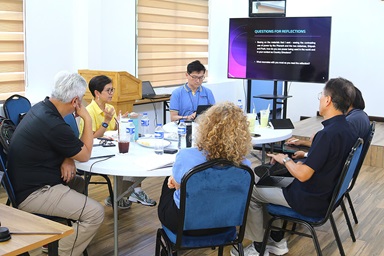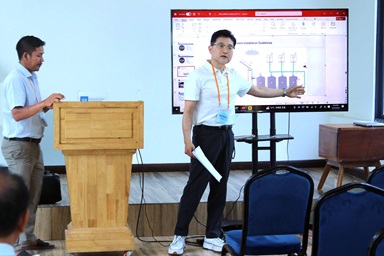A 40-day march from Manila to Tacloban – now proceeding through areas devastated by Typhoon Haiyan – is aimed at encouraging both grassroots and world leaders to confront the crisis of global climate change by highlighting its effect on vulnerable countries like the Philippines.
The marchers will cross the San Juanico Bridge towards Tacloban City on Nov. 8, the anniversary of the Category 5 storm that cut a swath of devastation across the tip of Cebu and tore through the three large island provinces of Samar, Leyte and Bohol.
Naderev "Yeb" Sano, commissioner of the Philippines Climate Change Commission and lead negotiator for the country during the 2013 U.N. climate summit in Warsaw, Poland, said that after a year of the severe devastation from the storm, marchers were not expecting the hopeful atmosphere they found along the 1,000-kilometer (621 mile) trek.
"Today, we have entered the severely hit zone of Typhoon Haiyan, and we got a rousing welcome,” Sano said in a telephone interview four days before the end of the march. “Each of the 36 days are extraordinary days. Each day is unique, something new is happening, we get to interact to different people. There are no low moments because of the uplifting experience to rediscover the Filipino spirit, in every town, to care for one another."
The marchers left Manila on Oct. 2, then headed through the provinces of Laguna, Batangas, Quezon, Camarines Norte, Camarines Sur, Albay, Sorsogon, Northern Samar, Samar and Leyte.
They hope the walk will inspire people around the world and encourage ambitious efforts by world leaders to confront the climate change.
Sano said the walk was demanding and was taking a physical toll on the marchers. He was sidelined at one point by an injury that required him to rest before rejoining the march.
Hospitality from everyone
The United Methodist Church, the Roman Catholic Church, the National Council of Churches in the Philippines and other organizations, along with local governments, have supported the march.
"The First United Methodist Church in Naga City has sheltered us and fed us," said Rommuel Flores, the son of a United Methodist pastor. Flores, along with Sano and two other walkers, gave their testimonies during worship.
Sano said marchers were offered a place to stay every night.
"The challenge was which offers we would take because so many organizations are offering the schools, church, barangay (village) halls, municipal halls," he said. While in Basey, the group slept in tents on a basketball court.
Governor Joey Salceda of the Albay province joined the marchers from Camarines Sur to Palangue.
Formal programs were held on more than half of the evenings. The programs consisted of a welcome affair hosted by the local community, then a series of films, and a speech by Sano encouraging people to heed the global call to climate action.
Then, one of the walkers would give a testimony. Finally, a climate disaster resilience tool kit was given to the mayor or vice mayor.
Climate toolkits
Resources in the toolkits can help with community planning in the face of climate change, assist in the protection of communities from climate disaster risks, and empower local communities to take control of their development destiny, according to organizers.
The information also offers assistance on how local policymakers can draft their own local climate change action plan, along with a sample plan from Camotes Island.
The island is considered an example of a best-practice triumph in the midst of climate disaster, since there were no deaths and only one injury there during Typhoon Haiyan. Officials attributed that good fortune to the commitment of their political leaders and the people to efforts to make the island resilient to climate disasters.
The power to rise up
"We have a song which we sing every day in our walk, 'Tayo tayo' which means 'Let us rise' in a march rhythm, " Sano said.
And he is optimistic that people will rise for change.
"If we believe we can do something, if we stay positive in making a difference, that is the power, and the power of the crowd to make things happen," Sano said.
His hope is that people will realize that they have power at the grassroots level to change things for the better, live sustainably, and build a culture of caring and accountability.
"We can't afford to lose this battle for humanity, it is a leap of faith to do something like this," Sano said.
Beyond the march
Many people have asked what happens after the walk, he noted.
Beyond serving as an instrument for non-violent protest, the walk has demonstrated that “solutions are in the hands of individuals," Sano said, adding that he hopes everyone will be encouraged to get involved.
"The destination of our climate walk is not Tacloban City, but the hearts and minds of people, people in the Philippines and in the whole world."
*Mangiduyos is a deaconess in the United Methodist Philippines Central Conference and a professor at Wesleyan University-Philippines in Cabanatuan City.
News media contact: Vicki Brown, news editor, newsdesk@umcom.org or 615-742-5469.
Like what you're reading? Support the ministry of UM News! Your support ensures the latest denominational news, dynamic stories and informative articles will continue to connect our global community. Make a tax-deductible donation at ResourceUMC.org/GiveUMCom.






